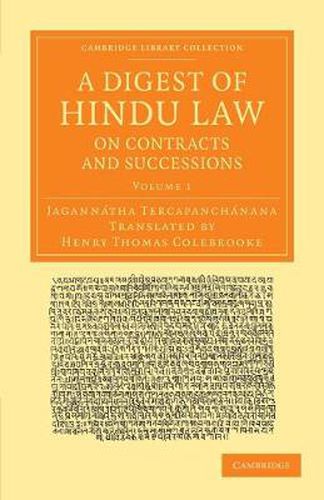Readings Newsletter
Become a Readings Member to make your shopping experience even easier.
Sign in or sign up for free!
You’re not far away from qualifying for FREE standard shipping within Australia
You’ve qualified for FREE standard shipping within Australia
The cart is loading…






An honorary professor of Sanskrit and Hindu law at Fort William College in Calcutta, and a key figure in the foundation of the Royal Asiatic Society, Henry Thomas Colebrooke (1765-1837) became Britain’s foremost orientalist during the early nineteenth century. Taking up the reins of Sanskrit scholarship following the death of Sir William Jones (1746-94), Colebrooke made several substantial contributions to Indic study. Through seminal publications such as a grammar of Sanskrit and an extended article on the Vedas, he provided unprecedented access to one of the world’s oldest languages and some of its oldest texts. Published in 1801, this three-volume translation of Brahman law was based on a Sanskrit compilation prepared by a pandit, Jagannatha Tercapanchanana, whose learned commentary is also featured in the work. Volume 1 elucidates Hindu jurisprudence on monetary issues, covering contracts, loans and deposits.
$9.00 standard shipping within Australia
FREE standard shipping within Australia for orders over $100.00
Express & International shipping calculated at checkout
An honorary professor of Sanskrit and Hindu law at Fort William College in Calcutta, and a key figure in the foundation of the Royal Asiatic Society, Henry Thomas Colebrooke (1765-1837) became Britain’s foremost orientalist during the early nineteenth century. Taking up the reins of Sanskrit scholarship following the death of Sir William Jones (1746-94), Colebrooke made several substantial contributions to Indic study. Through seminal publications such as a grammar of Sanskrit and an extended article on the Vedas, he provided unprecedented access to one of the world’s oldest languages and some of its oldest texts. Published in 1801, this three-volume translation of Brahman law was based on a Sanskrit compilation prepared by a pandit, Jagannatha Tercapanchanana, whose learned commentary is also featured in the work. Volume 1 elucidates Hindu jurisprudence on monetary issues, covering contracts, loans and deposits.